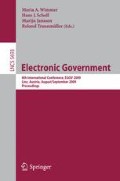Abstract
In this paper, we introduce a network enabled coordination model to examine the coordination preparedness of soft-target organisations such as common public access areas including transit hubs, schools, parks, and sports areas. It is apparent that little attention is given in recent research focusing on the use of network analysis as a way to explore coordination preparedness for this type of organisation. In this study, we emphasise this type of soft-target organisation and propose a model to examine the coordination preparedness to any disasters by testing hypothesis related to network relationship and coordination preparedness. We analyse the dataset entitled Preparedness of Large Retail Malls to Prevent and Respond to Terrorist Attack, 2004, which contains a total of 120 completed surveys of security directors of retail malls. The following questions form the basis of this study: What do soft-target organisations need to be better prepared to respond to disaster? How does network relationship between soft-target organisation and emergency agencies affect the coordination preparedness of soft-target organisation for disaster recovery? Which degree of centrality measure needs to be followed to measure network variables in order to analyse the coordination preparedness? Result shows that soft-target organisation with high level of network relationship with other emergency agencies are better prepared to disaster response. Using this result, the preparedness of a soft-target organisation might be judged for successfully participation in an actual emergency.
Access this chapter
Tax calculation will be finalised at checkout
Purchases are for personal use only
Preview
Unable to display preview. Download preview PDF.
References
Baligh, H.H.: Decision rules and transactions, organisations, and markets. Management Science 32, 1480–1491 (1986)
Beaumont, P., Chaib-draa, B.: Multi-Platform Coordination in Command and Control. National Science and Engineering Research Council of Canada (2005)
Brandes, U., Fleischer, D.: Centrality Measures Based on Current Flow. In: Diekert, V., Durand, B. (eds.) STACS 2005. LNCS, vol. 3404, pp. 533–544. Springer, Heidelberg (2005)
Comfort, L., Kapucu, N.: Inter-organisational coordination in extreme events: The World Trade Center attacks, September 11, 2001. Natural Hazards, 309–327 (2003)
Davis, R.C., Ortiz, C., Rowe, R., Broz, J., Rigakos, G., Collins, P.: An Assessment of the Preparedness of Large Retail Malls to Prevent and Respond to Terrorist Attack, A report submitted to U.S. Department of Justice (2006)
Donini, A., Niland, N.R.: Lessons Learned, A Report on the Coordination of Humanitarian Activities. United Nations Department of Humanitarian Affairs, New York (1994)
Freeman, L.C.: Centrality in Social Networks: Conceptual Classification. Social Networks, 215–239 (1978)
Kapucu, N.: Inter-organisational Coordination in Dynamic Context: Network in Emergency Response Managements. Connections, 33–48 (2005)
Kirn, S., Gasser, L.: Organisational Approaches to Coordination in Multi-Agent Systems. National Science Foundation, Arlington (1998)
Krugman, P.: A Can’t-Do Government, The New York Times, published on September 2 (2005)
Kruke, B.I., Olsen, O.E.: Reliability-seeking network in complex emergencies. Int. J. Emergency Management 2(4), 275–291 (2005)
Kuti, M.: Cordnet – Towards a distributed behavioral model for emergency response coordination, A thesis submitted to the Faculty of the University of Sydney (2007)
Malone, T.W.: Modeling coordination in organizations and markets. Management Science 33, 1317–1332 (1987)
Malone, T.W.: What is Coordination Theory? National Science Foundation Coordination Theory Workshop, Massachusetts Institute of Technology, Cambridge, USA (1988)
Malone, T.W., Crowston, K.: The Interdisciplinary Study of Coordination. ACM Computing Surveys 26(1) (1994)
Mullen, B., Johnson, C., Salas, E.: Effects of communication network structures: Components of positional centrality. Social Networks 13, 169–186 (1991)
Rathnam, S., Mahajan, V., Whinston, A.B.: Facilitating Coordination in Customer Support Teams: A Framework and Its Implications for the Design of Information Technology. Management Science 41(12), 1900–1921 (1995)
Riley, K.J., Hoffman, B.: Domestic Terrorism, A National Assessment of State and Local Preparedness. RAND (1995)
Wasserman, S., Faust, K.: Social Network Analysis: Methods and Applications. Cambridge University Press, New York (1994); Appendix: Springer-Author Discount
Author information
Authors and Affiliations
Editor information
Editors and Affiliations
Rights and permissions
Copyright information
© 2009 Springer-Verlag Berlin Heidelberg
About this paper
Cite this paper
Uddin, M.S., Hossain, L. (2009). Towards Coordination Preparedness of Soft-Target Organisation. In: Wimmer, M.A., Scholl, H.J., Janssen, M., Traunmüller, R. (eds) Electronic Government. EGOV 2009. Lecture Notes in Computer Science, vol 5693. Springer, Berlin, Heidelberg. https://doi.org/10.1007/978-3-642-03516-6_5
Download citation
DOI: https://doi.org/10.1007/978-3-642-03516-6_5
Publisher Name: Springer, Berlin, Heidelberg
Print ISBN: 978-3-642-03515-9
Online ISBN: 978-3-642-03516-6
eBook Packages: Computer ScienceComputer Science (R0)

